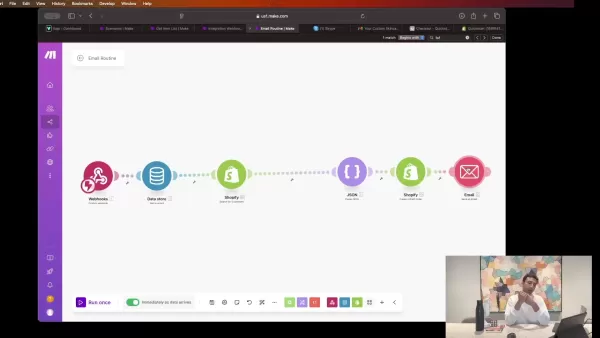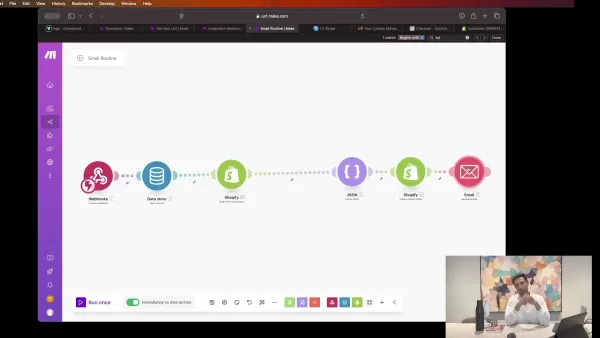AI-Powered Shopify Personal Shopper: No-Code Case Study
In the fast-paced world of e-commerce, standing out from the crowd and boosting sales often hinges on personalization. Imagine having an AI-powered personal shopper that transforms your shopping experience by offering personalized product recommendations and simplifying the buying process. This article dives into a compelling case study of creating such a system for a Shopify store using only no-code tools, making it feasible for businesses of all sizes. We'll explore the journey of building a Shopify personal shopper, emphasizing the importance of data pipelines and automation workflows.
Key Points
- Building an AI-powered personal shopper involves mastering data pipelines and automation.
- No-code tools enable businesses to create sophisticated solutions without coding expertise.
- Generative AI boosts the personalization features of e-commerce platforms.
- AI voice agents can engage with customers via phone, offering tailored recommendations.
- Integrating Shopify with AI tools enhances the shopping experience and increases sales.
Understanding the Shopify Personal Shopper
What is a Shopify Personal Shopper?
A Shopify personal shopper is a cutting-edge solution that delivers a customized shopping experience. By harnessing the power of artificial intelligence (AI), it analyzes customer data to understand their preferences and suggest products that meet their unique needs. This goes beyond traditional online shopping, creating a more engaging and efficient experience. The goal is to provide a seamless customer journey, effectively bridging the gap between physical and online shopping through AI-driven automation.
In today's crowded e-commerce landscape, personalization is no longer a luxury—it's a necessity. With so many choices, it can be overwhelming for customers to find what they need. A personal shopper helps cut through the clutter, presenting them with relevant products and making decision-making easier.
Generative AI is pivotal in crafting a truly personalized experience. It can sift through vast amounts of data, such as past purchases, browsing history, and demographic details, to generate precise and relevant recommendations. By grasping the subtleties of customer behavior, Generative AI can anticipate their future needs and offer proactive suggestions.

The Power of No-Code in E-commerce
No-code platforms have revolutionized software development, allowing individuals and businesses without coding skills to create complex applications. In e-commerce, no-code tools offer a robust way to develop personalized shopping experiences without extensive coding. These platforms provide user-friendly interfaces and pre-built components, making it easy to construct intricate workflows.
Benefits of No-Code Development:
- Accessibility: No-code platforms make development accessible to a broader audience, regardless of technical background.
- Speed: They significantly reduce development time, enabling quick implementation and iteration of solutions.
- Cost-Effectiveness: By eliminating the need for specialized developers, no-code tools can drastically cut development costs.
- Flexibility: These platforms offer high levels of customization, allowing businesses to tailor solutions to their specific needs.
Data pipelines and automation workflows are crucial for any effective AI-powered personal shopper. These pipelines ensure seamless data flow between systems, while automation workflows streamline repetitive tasks, freeing up time for more strategic efforts. No-code tools offer a visual approach to creating and managing these pipelines, simplifying the integration of various data sources and automating key processes.
The Demonstration: A Real-World Example
The AI Agent in Action
A demonstration of the AI-powered Shopify personal shopper shows its practical application. A user calls the system, and an AI voice agent, named Jenny, greets them and starts gathering information. Upon learning that the caller doesn't have a proper skincare routine, Jenny enthusiastically offers to help create one from scratch. She inquires about skin type, sensitivity to chemical products, and skincare goals, tailoring the recommendations to the customer's specific needs.
The AI agent checks the customer's purchase history and available products, mentioning items like 'Neutrogena Oil-Free Acne Face Wash with Salicylic Acid' and 'Paula’s Choice Clinical Pro-Retinoid Dual-Retinol Treatment'. Jenny asks if these products have worked well for the caller. If the response is negative, similar products will be avoided in future recommendations. This demonstration showcases how AI can mimic human interaction to provide personalized recommendations.

The Customer Journey: From Call to Cart
The demonstration illustrates the seamless integration between the AI voice agent and the Shopify store. After the phone conversation, the customer receives an email summarizing the recommended skincare routine, with direct links to the products on the Shopify store, making it easy to add them to the cart and complete the purchase.
The email is personalized with the customer's name and includes a call to action, such as "Hi Imran, Click here to get the skincare routine custom for you!" The customer can add the products to their cart and check out with just a few clicks, streamlining the process and encouraging purchases.


Behind the Scenes: Automation Workflows
The Shopify personal shopper operates through a series of automation workflows that manage different system components. These workflows are built using a no-code platform, enabling individuals without programming expertise to create and manage them. Tools like Make.com are used for these automation workflows, with steps such as HTTP, JSON, and Webhooks to make requests for customers.
Creating a Shopify Personal Shopper
The Shopify Personal Shopper Case Study
The case study centers on a Shopify store selling skincare products. The challenge was to develop a personal shopper that could interact with customers, understand their skincare needs, and recommend products from the store's inventory using only no-code tools.
- Phone-Based AI Voice Agent: The personal shopper is accessible via a phone call. An AI voice agent gathers information about the customer's skin type, concerns, and preferences.
- Analyzing Customer Data: The AI agent analyzes the customer's responses and past purchase history, if available, to create a personalized profile and generate tailored recommendations.
- Product Recommendations: Based on the customer's profile, the AI agent suggests a skincare routine, explaining the benefits of each product and how it fits into the overall regimen.
- Email Integration: After the conversation, the AI agent sends a personalized email summarizing the recommended skincare routine, with links to purchase the products on the Shopify store.

Key Steps in Building the Personal Shopper
- Defining the Scope: Clearly outline the project's scope, including target audience, product types, and goals of the personal shopper.
- Choosing the Right No-Code Tools: Select tools that integrate with Shopify, offer AI capabilities, and provide visual workflow design.
- Data Collection and Integration: Integrate Shopify with other data sources like CRM systems to gather comprehensive customer data.
- Building the AI Voice Agent: Use a no-code platform to design the AI voice agent, defining conversation flow, training on skincare knowledge, and integrating with the Shopify store.
- Creating the Recommendation Engine: Develop a recommendation engine that analyzes customer data and generates personalized product suggestions using AI algorithms or rule-based systems.
- Email Automation: Set up an email automation system to send personalized emails after the phone conversation, including a summary of the recommended skincare routine and purchase links.
- Testing and Optimization: Thoroughly test the personal shopper for accuracy and relevance, and continuously optimize based on customer feedback and performance data.
Pricing of the Products
Pricing Details
The demonstration highlighted the integration with the customer's Shopify store, showcasing the pricing of recommended products. The checkout screen listed 'CeraVe Hydrating Daily Face Wash' for $30 CAD, 'CeraVe Resurfacing Retinol Serum' for $15 CAD, and 'CeraVe Daily Moisturizing Lotion' with shipping at $14.90 CAD. The lotion was free, making the total for the Skincare Routine $59.90 CAD. Note that pricing can vary depending on the provider and location.
Pros and Cons
Pros
- Increased Customer Engagement: AI can provide tailored recommendations, enhancing customer engagement.
- Increased Efficiency: AI automation streamlines the sales pipeline, making the process more efficient.
- Reduced Coding Efforts: Implementing AI-powered chatbots without coding reduces the need for technical expertise.
Cons
- Need for AI Maintenance: AI requires ongoing maintenance to remain effective, as it depends on the quality of data it can access.
- Implementation Costs: There's a learning curve and time investment involved in setting up AI systems.
- Lack of Customization: Pre-built features and components in AI systems may limit customization to individual user needs.
FAQ
Can I implement the Shopify Personal Shopper with limited technical skills?
Absolutely, with no-code tools, it's quite feasible to build a Shopify personal shopper even if you have limited technical skills. These tools allow you to visually create workflows and use pre-built components, minimizing the need for coding. This approach enables businesses to quickly personalize shopping experiences, though a basic understanding of data integration and workflow automation can be helpful.
How does the AI personal shopper handle customer data privacy?
Customer data privacy is crucial. The AI system must comply with all relevant data privacy laws, obtaining consent for data collection, anonymizing data when possible, and securely storing it. Transparency about how customer data is used is also essential.
What level of Shopify access is required to integrate with the AI personal shopper?
Full access to all Shopify features is necessary for integrating the AI personal shopper. This access allows seamless integration to pull product data, customer information, and purchase history, ensuring the AI has the information needed to personalize recommendations and enhance the shopping experience.
Related Questions
What other integrations could be combined with this Shopify personal shopper for additional features?
Additional integrations could enhance the Shopify personal shopper with features like a loyalty program to apply discounts or a referral reward system to incentivize customers to bring others to the site.
Is AI a good fit for my business?
AI has evolved to support various business operations, from customer relationships to finance and sales and marketing. With its innovative capabilities, AI can benefit businesses of all sizes, helping to streamline processes and enhance customer experiences.
Related article
 Google's Gemini app adds real-time AI video, Deep Research, and new features (120 chars)
Google unveiled significant Gemini AI enhancements during its I/O 2025 developer conference, expanding multimodal capabilities, introducing next-generation AI models, and strengthening ecosystem integrations across its product portfolio.Key Gemini Li
Google's Gemini app adds real-time AI video, Deep Research, and new features (120 chars)
Google unveiled significant Gemini AI enhancements during its I/O 2025 developer conference, expanding multimodal capabilities, introducing next-generation AI models, and strengthening ecosystem integrations across its product portfolio.Key Gemini Li
 Assort Health Secures $50M Funding to Automate Patient Communication
Assort Health, an emerging AI healthcare startup specializing in automated patient communications for specialty practices, has secured approximately $50 million in Series B funding at a $750 million valuation, according to sources familiar with the t
Assort Health Secures $50M Funding to Automate Patient Communication
Assort Health, an emerging AI healthcare startup specializing in automated patient communications for specialty practices, has secured approximately $50 million in Series B funding at a $750 million valuation, according to sources familiar with the t
 Generate Excel Formulas Instantly with AI-Powered Excel Tool
Transform your spreadsheet workflow with GPTExcel - the AI-powered solution that converts natural language descriptions into precise Excel and Google Sheets formulas. This powerful tool eliminates the frustration of manual formula creation, making co
Comments (38)
0/200
Generate Excel Formulas Instantly with AI-Powered Excel Tool
Transform your spreadsheet workflow with GPTExcel - the AI-powered solution that converts natural language descriptions into precise Excel and Google Sheets formulas. This powerful tool eliminates the frustration of manual formula creation, making co
Comments (38)
0/200
![BrianLewis]() BrianLewis
BrianLewis
 August 12, 2025 at 3:01:00 PM EDT
August 12, 2025 at 3:01:00 PM EDT
This AI shopper sounds cool, but will it really understand my style? Excited to see how it boosts sales! 😎


 0
0
![JasonKing]() JasonKing
JasonKing
 August 4, 2025 at 2:48:52 AM EDT
August 4, 2025 at 2:48:52 AM EDT
This AI shopper idea is super cool! 🛍️ It’s like having a friend who knows exactly what you want. Wonder how it handles privacy though?


 0
0
![PatrickSmith]() PatrickSmith
PatrickSmith
 July 21, 2025 at 9:25:03 PM EDT
July 21, 2025 at 9:25:03 PM EDT
This AI shopper sounds like a game-changer for e-commerce! I love how it tailors recommendations to make shopping feel so personal. Curious how smaller stores can afford this tech, though—any cost details? 😄


 0
0
![JerryGonzález]() JerryGonzález
JerryGonzález
 April 25, 2025 at 5:58:24 PM EDT
April 25, 2025 at 5:58:24 PM EDT
ShopifyのAIパーソナルショッパーは素晴らしいです!買い物がずっと簡単になり、推薦もぴったりでした。ただ、時々自動化されすぎている感じがします。でも、ノーコードのソリューションで本当に売上を増やします。ぜひ試してみてください!🛍️


 0
0
![WillieMartinez]() WillieMartinez
WillieMartinez
 April 24, 2025 at 1:22:00 PM EDT
April 24, 2025 at 1:22:00 PM EDT
The AI-powered Shopify Personal Shopper is a game-changer! It made shopping so much easier and the recommendations were spot on. Only thing is, it sometimes feels a bit too automated. But hey, it's a no-code solution and really boosts sales. Definitely give it a try! 🛍️


 0
0
![JoeLee]() JoeLee
JoeLee
 April 22, 2025 at 5:47:35 PM EDT
April 22, 2025 at 5:47:35 PM EDT
El personal shopper impulsado por IA de Shopify es un cambio de juego! Hace que la compra sea mucho más fácil con recomendaciones personalizadas. El único inconveniente es que a veces puede ser un poco abrumador con demasiadas opciones. Aún así, es imprescindible para cualquier tienda de comercio electrónico que quiera aumentar sus ventas! 😊


 0
0
In the fast-paced world of e-commerce, standing out from the crowd and boosting sales often hinges on personalization. Imagine having an AI-powered personal shopper that transforms your shopping experience by offering personalized product recommendations and simplifying the buying process. This article dives into a compelling case study of creating such a system for a Shopify store using only no-code tools, making it feasible for businesses of all sizes. We'll explore the journey of building a Shopify personal shopper, emphasizing the importance of data pipelines and automation workflows.
Key Points
- Building an AI-powered personal shopper involves mastering data pipelines and automation.
- No-code tools enable businesses to create sophisticated solutions without coding expertise.
- Generative AI boosts the personalization features of e-commerce platforms.
- AI voice agents can engage with customers via phone, offering tailored recommendations.
- Integrating Shopify with AI tools enhances the shopping experience and increases sales.
Understanding the Shopify Personal Shopper
What is a Shopify Personal Shopper?
A Shopify personal shopper is a cutting-edge solution that delivers a customized shopping experience. By harnessing the power of artificial intelligence (AI), it analyzes customer data to understand their preferences and suggest products that meet their unique needs. This goes beyond traditional online shopping, creating a more engaging and efficient experience. The goal is to provide a seamless customer journey, effectively bridging the gap between physical and online shopping through AI-driven automation.
In today's crowded e-commerce landscape, personalization is no longer a luxury—it's a necessity. With so many choices, it can be overwhelming for customers to find what they need. A personal shopper helps cut through the clutter, presenting them with relevant products and making decision-making easier.
Generative AI is pivotal in crafting a truly personalized experience. It can sift through vast amounts of data, such as past purchases, browsing history, and demographic details, to generate precise and relevant recommendations. By grasping the subtleties of customer behavior, Generative AI can anticipate their future needs and offer proactive suggestions.

The Power of No-Code in E-commerce
No-code platforms have revolutionized software development, allowing individuals and businesses without coding skills to create complex applications. In e-commerce, no-code tools offer a robust way to develop personalized shopping experiences without extensive coding. These platforms provide user-friendly interfaces and pre-built components, making it easy to construct intricate workflows.
Benefits of No-Code Development:
- Accessibility: No-code platforms make development accessible to a broader audience, regardless of technical background.
- Speed: They significantly reduce development time, enabling quick implementation and iteration of solutions.
- Cost-Effectiveness: By eliminating the need for specialized developers, no-code tools can drastically cut development costs.
- Flexibility: These platforms offer high levels of customization, allowing businesses to tailor solutions to their specific needs.
Data pipelines and automation workflows are crucial for any effective AI-powered personal shopper. These pipelines ensure seamless data flow between systems, while automation workflows streamline repetitive tasks, freeing up time for more strategic efforts. No-code tools offer a visual approach to creating and managing these pipelines, simplifying the integration of various data sources and automating key processes.
The Demonstration: A Real-World Example
The AI Agent in Action
A demonstration of the AI-powered Shopify personal shopper shows its practical application. A user calls the system, and an AI voice agent, named Jenny, greets them and starts gathering information. Upon learning that the caller doesn't have a proper skincare routine, Jenny enthusiastically offers to help create one from scratch. She inquires about skin type, sensitivity to chemical products, and skincare goals, tailoring the recommendations to the customer's specific needs.
The AI agent checks the customer's purchase history and available products, mentioning items like 'Neutrogena Oil-Free Acne Face Wash with Salicylic Acid' and 'Paula’s Choice Clinical Pro-Retinoid Dual-Retinol Treatment'. Jenny asks if these products have worked well for the caller. If the response is negative, similar products will be avoided in future recommendations. This demonstration showcases how AI can mimic human interaction to provide personalized recommendations.

The Customer Journey: From Call to Cart
The demonstration illustrates the seamless integration between the AI voice agent and the Shopify store. After the phone conversation, the customer receives an email summarizing the recommended skincare routine, with direct links to the products on the Shopify store, making it easy to add them to the cart and complete the purchase.
The email is personalized with the customer's name and includes a call to action, such as "Hi Imran, Click here to get the skincare routine custom for you!" The customer can add the products to their cart and check out with just a few clicks, streamlining the process and encouraging purchases.


Behind the Scenes: Automation Workflows
The Shopify personal shopper operates through a series of automation workflows that manage different system components. These workflows are built using a no-code platform, enabling individuals without programming expertise to create and manage them. Tools like Make.com are used for these automation workflows, with steps such as HTTP, JSON, and Webhooks to make requests for customers.
Creating a Shopify Personal Shopper
The Shopify Personal Shopper Case Study
The case study centers on a Shopify store selling skincare products. The challenge was to develop a personal shopper that could interact with customers, understand their skincare needs, and recommend products from the store's inventory using only no-code tools.
- Phone-Based AI Voice Agent: The personal shopper is accessible via a phone call. An AI voice agent gathers information about the customer's skin type, concerns, and preferences.
- Analyzing Customer Data: The AI agent analyzes the customer's responses and past purchase history, if available, to create a personalized profile and generate tailored recommendations.
- Product Recommendations: Based on the customer's profile, the AI agent suggests a skincare routine, explaining the benefits of each product and how it fits into the overall regimen.
- Email Integration: After the conversation, the AI agent sends a personalized email summarizing the recommended skincare routine, with links to purchase the products on the Shopify store.

Key Steps in Building the Personal Shopper
- Defining the Scope: Clearly outline the project's scope, including target audience, product types, and goals of the personal shopper.
- Choosing the Right No-Code Tools: Select tools that integrate with Shopify, offer AI capabilities, and provide visual workflow design.
- Data Collection and Integration: Integrate Shopify with other data sources like CRM systems to gather comprehensive customer data.
- Building the AI Voice Agent: Use a no-code platform to design the AI voice agent, defining conversation flow, training on skincare knowledge, and integrating with the Shopify store.
- Creating the Recommendation Engine: Develop a recommendation engine that analyzes customer data and generates personalized product suggestions using AI algorithms or rule-based systems.
- Email Automation: Set up an email automation system to send personalized emails after the phone conversation, including a summary of the recommended skincare routine and purchase links.
- Testing and Optimization: Thoroughly test the personal shopper for accuracy and relevance, and continuously optimize based on customer feedback and performance data.
Pricing of the Products
Pricing Details
The demonstration highlighted the integration with the customer's Shopify store, showcasing the pricing of recommended products. The checkout screen listed 'CeraVe Hydrating Daily Face Wash' for $30 CAD, 'CeraVe Resurfacing Retinol Serum' for $15 CAD, and 'CeraVe Daily Moisturizing Lotion' with shipping at $14.90 CAD. The lotion was free, making the total for the Skincare Routine $59.90 CAD. Note that pricing can vary depending on the provider and location.
Pros and Cons
Pros
- Increased Customer Engagement: AI can provide tailored recommendations, enhancing customer engagement.
- Increased Efficiency: AI automation streamlines the sales pipeline, making the process more efficient.
- Reduced Coding Efforts: Implementing AI-powered chatbots without coding reduces the need for technical expertise.
Cons
- Need for AI Maintenance: AI requires ongoing maintenance to remain effective, as it depends on the quality of data it can access.
- Implementation Costs: There's a learning curve and time investment involved in setting up AI systems.
- Lack of Customization: Pre-built features and components in AI systems may limit customization to individual user needs.
FAQ
Can I implement the Shopify Personal Shopper with limited technical skills?
Absolutely, with no-code tools, it's quite feasible to build a Shopify personal shopper even if you have limited technical skills. These tools allow you to visually create workflows and use pre-built components, minimizing the need for coding. This approach enables businesses to quickly personalize shopping experiences, though a basic understanding of data integration and workflow automation can be helpful.
How does the AI personal shopper handle customer data privacy?
Customer data privacy is crucial. The AI system must comply with all relevant data privacy laws, obtaining consent for data collection, anonymizing data when possible, and securely storing it. Transparency about how customer data is used is also essential.
What level of Shopify access is required to integrate with the AI personal shopper?
Full access to all Shopify features is necessary for integrating the AI personal shopper. This access allows seamless integration to pull product data, customer information, and purchase history, ensuring the AI has the information needed to personalize recommendations and enhance the shopping experience.
Related Questions
What other integrations could be combined with this Shopify personal shopper for additional features?
Additional integrations could enhance the Shopify personal shopper with features like a loyalty program to apply discounts or a referral reward system to incentivize customers to bring others to the site.
Is AI a good fit for my business?
AI has evolved to support various business operations, from customer relationships to finance and sales and marketing. With its innovative capabilities, AI can benefit businesses of all sizes, helping to streamline processes and enhance customer experiences.
 Assort Health Secures $50M Funding to Automate Patient Communication
Assort Health, an emerging AI healthcare startup specializing in automated patient communications for specialty practices, has secured approximately $50 million in Series B funding at a $750 million valuation, according to sources familiar with the t
Assort Health Secures $50M Funding to Automate Patient Communication
Assort Health, an emerging AI healthcare startup specializing in automated patient communications for specialty practices, has secured approximately $50 million in Series B funding at a $750 million valuation, according to sources familiar with the t
 Generate Excel Formulas Instantly with AI-Powered Excel Tool
Transform your spreadsheet workflow with GPTExcel - the AI-powered solution that converts natural language descriptions into precise Excel and Google Sheets formulas. This powerful tool eliminates the frustration of manual formula creation, making co
Generate Excel Formulas Instantly with AI-Powered Excel Tool
Transform your spreadsheet workflow with GPTExcel - the AI-powered solution that converts natural language descriptions into precise Excel and Google Sheets formulas. This powerful tool eliminates the frustration of manual formula creation, making co
 August 12, 2025 at 3:01:00 PM EDT
August 12, 2025 at 3:01:00 PM EDT
This AI shopper sounds cool, but will it really understand my style? Excited to see how it boosts sales! 😎


 0
0
 August 4, 2025 at 2:48:52 AM EDT
August 4, 2025 at 2:48:52 AM EDT
This AI shopper idea is super cool! 🛍️ It’s like having a friend who knows exactly what you want. Wonder how it handles privacy though?


 0
0
 July 21, 2025 at 9:25:03 PM EDT
July 21, 2025 at 9:25:03 PM EDT
This AI shopper sounds like a game-changer for e-commerce! I love how it tailors recommendations to make shopping feel so personal. Curious how smaller stores can afford this tech, though—any cost details? 😄


 0
0
 April 25, 2025 at 5:58:24 PM EDT
April 25, 2025 at 5:58:24 PM EDT
ShopifyのAIパーソナルショッパーは素晴らしいです!買い物がずっと簡単になり、推薦もぴったりでした。ただ、時々自動化されすぎている感じがします。でも、ノーコードのソリューションで本当に売上を増やします。ぜひ試してみてください!🛍️


 0
0
 April 24, 2025 at 1:22:00 PM EDT
April 24, 2025 at 1:22:00 PM EDT
The AI-powered Shopify Personal Shopper is a game-changer! It made shopping so much easier and the recommendations were spot on. Only thing is, it sometimes feels a bit too automated. But hey, it's a no-code solution and really boosts sales. Definitely give it a try! 🛍️


 0
0
 April 22, 2025 at 5:47:35 PM EDT
April 22, 2025 at 5:47:35 PM EDT
El personal shopper impulsado por IA de Shopify es un cambio de juego! Hace que la compra sea mucho más fácil con recomendaciones personalizadas. El único inconveniente es que a veces puede ser un poco abrumador con demasiadas opciones. Aún así, es imprescindible para cualquier tienda de comercio electrónico que quiera aumentar sus ventas! 😊


 0
0





























